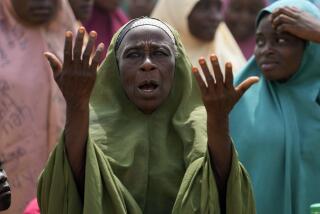Olusegun Obasanjo: Nigerian Survivor
- Share via
WASHINGTON — In the turbulent world of Nigerian politics, feisty, outspoken Olusegun Obasanjo has done it all. He’s been army chief, military ruler, political prisoner and finally, in Nigeria’s third stab at democracy in 1999, victor in democratic elections for president. Now the future of Africa’s most populous country depends on whether he can transform one of the world’s most troubled countries. The United States is cautiously optimistic. Secretary of State Colin L. Powell told Congress in March, “We can be proud now [of] the start the President Obasanjo has made putting his country back on the right path.”
Over the past two years, the Nigerian leader has taken bold steps, opening the way for press freedoms, robust local governments and an active parliament while marginalizing the once omnipotent military. He’s also played a leading role in regional stability, deploying peacekeepers in strife-torn neighboring countries.
But the odds of success remain daunting. Nigeria is divided by deep religious and tribal differences. It is the world’s sixth largest oil exporter, yet suffers from one of the world’s worst energy crises. Despite its wealth of natural resources, per-capita income today is less than it was in 1980. Corruption is “endemic” and the economy “static,” a recent State Department report warned. Nigeria’s water and power systems, roads and ports are rapidly “collapsing,” it added. “Society is basically broken,” concluded a U.S. official.
Obasanjo, still boisterous at age 64, has admitted as much. In a candid assessment, he told journalists earlier this year that Lagos, the teeming commercial center and former capital of 15 million, was “an urban jungle which should not be inhabited by any sane person.” Obasanjo was interviewed during his recent visit to Washington.
Question: What can the United States do to help Nigeria today?
Answer: We just established democracy. We want our democracy to be strengthened. We adopted democracy not just for the intrinsic value of democracy, but because our people believe that democracy can enhance their quality of life. They expect, rightly, a democracy dividend. If that doesn’t come, they will feel disenchanted. The U.S. can help us with that.
I cannot give a democracy dividend to Nigerians if I cannot improve the health services, if I cannot provide food and the education for the children, if I cannot provide potable water, if I cannot make sure that there is electricity in every hamlet or that there is a hard road from their villages to markets. But I will only be able to do this if I have enough resources. Democracy and all the good things that go with it--the rule of law, human rights--will only be sustainable if we have a thriving economy and social development that satisfies the basic needs of our society.
Q: You came to power for the first time in 1976 after a military coup. Now you’re a democratically elected president. What is different about Nigeria today? Will democracy be able to survive this time?
A: Democracy not only can, it will survive. The parameters have changed. One, we are no longer in the Cold War. During the Cold War, it became fashionable for a man to come to power through the barrel of a gun and for the world to accept it. One of the things we did in Africa was say that we would not accept in the Organization of African Union Summit anybody who did not come to power through democratic means. That’s a huge development. We said Ivory Coast cannot stay. Two, the situation in Nigeria has changed. I believe there are people who today will say they would rather die fighting for democracy than allow another non-democratic election. People now enjoy freedoms they haven’t enjoyed before.
Q: You mentioned the dividends of democracy. But today, two years after an election brought you to power, many of the public’s expectations have not been met. What progress has been made?
A: Don’t believe what you read. In the space of two years, all workers in the public sector have had their salary more than doubled and with inflation still kept at one digit. We have also established universal basic education--a nine-year compulsory education for all Nigerian children. Primary health, which was neglected, is fixed. And investors are coming. Nigerians who didn’t want to come home before are coming home.
Q: Several states in northern Nigeria have opposed Sharia, Islamic law, which has sparked clashes and led to hundreds of deaths over the past year. How big a problem are religious, ethnic and tribal differences today?
A: We had a clash in [the northern city of] Kaduna, but it was not only about religion. Kaduna has always [had elements of both] north and south--and the disparity in development between north and south. Unfortunately, that also coincides with religion--the north is essentially Muslim and the south is essentially Christian. The only thing that really worries me about Nigeria is disparity in development, not ethnicity or religion. If we do not have even development, that will be a serious cause of conflict.
Q: On economic issues, Nigeria is regularly rated as one of the most corrupt countries. Economists estimate that graft adds up to 30% to the cost of doing business. How bad is corruption? And what are you doing about it?
A: That’s a stereotype. The first bill I sent to the National Assembly was an anticorruption bill. It took them more than one year to pass the bill. Yes, there was a time when corruption was pervasive, and I don’t say we have eliminated corruption completely. But I think to be fair to Nigeria, corruption has ceased to be what it once was.
Q: Nigeria’s current budget calls for $330 million for a national soccer stadium in Abuja, more than is reportedly being spent on either health or education. The government is also spending tens of millions of dollars on aircraft for the executive branch of government. Yet, Nigeria has a total of $35 billion in debts. How can you justify those expenses? What do you say to people who say you’re just like all of Nigeria’s past leaders?
A: One of the things putting Nigeria on the map today is its soccer players. It was in your country, Atlanta, that we won the World Cup. And if they have nowhere at all to play, they would not have done that. I went to Turkey and the prime minister said we have five Nigerians playing for us. There are Nigerians playing all over the world. And we’re going to stage in the year 2003 the Africa games in Nigeria. If what you are saying to me is that the cost of building the stadium is more than what it should be, I will agree with you. But if what you are saying to me is that we should not build the stadium, I would not agree, because it’s part of our national assets. We need to dream.
You talk about aircraft. But don’t expect me as Nigerian president or any head of state to have any aircraft that when it’s taxiing to take off bumps and goes down. That’s what happened to my own aircraft because that aircraft was more than 20 years old. If they say I am not any better than any other leader, then that is what they think. But others know that I am better.
Q: In April you hosted a major international conference on AIDS, a disease that’s devastating the continent. What can Africa do to help itself? We all know that Africa wants help with drugs from foreign companies, but what can Africa do to help itself. How is AIDS changing Africa’s future?
A: The way it’s being presented outside is that half of Africa has been destroyed or devastated, and that’s not the case. Yes, HIV/AIDS is real. But one country that we thought would virtually be wiped out was Uganda, and now almost entirely on its steam Uganda has reversed the trend. If it can be done in Uganda, it can be done everywhere.
Q: The world has never seen as wide an economic gap as it has today between the rich and the poor. The poorest countries in the world are largely in Africa. What does this economic gap mean for the future of Africa?
A: Africa must know that it cannot ape the development model of the rest of the world. Africa must go forward with a development model that takes care of what I call the essentials of life--health, education, labor saving devices that enable farmers to increase production, electricity, roads from village to markets--those things that make a substantial difference.
It would be a pity if we conduct ourselves as we have done in the past, trying to copy the economic progress of those who developed in the industrial revolution. We must devise a model that is relevant to our culture and relevant to this time.
More to Read
Sign up for Essential California
The most important California stories and recommendations in your inbox every morning.
You may occasionally receive promotional content from the Los Angeles Times.













